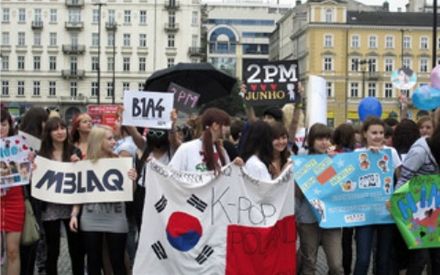The Korean wave[1] (Hangul: 한류; Hanja: 韓流; RR: Hanryu; MR: Hallyu) refers to the significant increase in the popularity of South Korean entertainment and culture starting in the 1990s, in Asia, and more recently in other parts of the world. As one put it, it represents a surge in the international visibility of Korean culture.[2] The term was coined in mid 1999 by Beijingjournalists surprised at the fast growing popularity of Korean entertainment and culture inChina.[3] The wave has had considerable impact on the South Korean economy, as well as on the political and cultural influence of South Korea. For example, in 2011 based on international activity the Korean wave added approximately USD$3.8 billion dollars of revenue to the South Korean economy.[4]
Peter Larsen from The Orange County Register, a daily newspaper published in California, called the Korean Wave a "pop culture tsunami flowing from South Korea to the United States and around the world".[5] One important aspect of the Korean wave is the use of Cultural technology to suit the tastes of overseas audiences.[6]
Contents[hide] |
[edit]Background
The Korean Wave, a term coined by Chinese journalists to refer to the significant increase in the popularity of South Korean entertainment and culture since the late 1990s,[8] first spread to China, Japan and other Asian countries, including Taiwan,Vietnam, Hong Kong, Philippines, Malaysia and Singapore.[9][10] Korean dramas were a key aspect of this proliferation, achieving a significant level of mainstream success in Japan, China, and Southeast Asia,[1][11]
[edit]Cultural technology
Another aspect of the Korean wave is the use of Cultural technology to suit the tastes of overseas audiences,[12] as well as the use of social media to reach a wider audience. During an official visit to South Korea in March 2012, US PresidentBarack Obama noted the rapid surge and spread of Korean pop culture and he praised South Korea’s youth for their tech-savviness and optimism, and remarked that "And you know that in our digital age, we can connect and innovate across borders like never before -- with your smart phones and Twitter and Me2day andKakaoTalk. It’s no wonder so many people around the world have caught the Korean Wave, Hallyu".[13][14]
Since 2002, Korean TV dramas and pop music have slowly moved to the Middle East,Eastern Europe, and parts of South America.[15] According to The New York Times, "attempts by K-pop (Korean popular music) stars to break into Western markets have largely failed prior to the proliferation of global social networks." However, K-pop artists are now gaining more international exposure through social media networks such as YouTube, Facebook, andTwitter, making it easier for them to reach a wider audience.[16]
Mark James Russell from the global politics magazine Foreign Policy acknowledges that Korean popular culture "may not (yet) turn heads in Los Angeles or London" but he claims that "the West is actually late to the party", noticing the Korean Wave only after the songGangnam Style by singer Psy was released.[15]
[edit]Rise of Gangnam Style
On July 15, 2012, the song Gangnam Style by the K-Pop singer Psy was released. The song is considered by some to be a worldwide phenomenon that has influenced global popular culture, and it also topped national music charts in Australia, Canada, France, Germany, and the United Kingdom.[17] According to the news agency Agence France-Presse, the "phenomenal" success of "Gangnam Style" has played a significant role in spreading the Korean Wave to other countries.[18]
As the song continued to attract worldwide media attention, it also led to various broadcasting networks and national newspapers focusing its attention on Korean popular music (K-pop) and other aspects of Korean culture. For example, The Daily Telegraph published an article recommending its readers to try out everything from K-Pop to "K-Cars", "K-Phones" and "K-Cuisine".[19]
[edit]Korean entertainment
Main articles: Korean drama, K-pop, Cinema of Korea, Manhwa, and Korean animation
Korean pop music, referred to as "K-pop" (an abbreviation of "Korean pop"), has played a significant role in the Korean wave.[20][21] In recent years, Korean entertainment companies have recognized YouTube as a key component for spreading Korean culture.[22]According to Bernie Cho, the president of the DFSB Kollective (a Seoul-based agency specializing in the marketing of international K-pop acts),[23] Korean entertainment companies are "aggressively steering their efforts to go international via the Internet".[24]
According to a 2006 Washington Post article, the increased popularity of South Korean entertainment has positively influenced Korean culture in areas such as food, clothing, video games, and the Korean language.[1][11] The popularity of K-pop music videos has been aided by crowdsourcing translation sites such as Viki, whose Creative Commons license translations help bridge language barriers.[25]
[edit]Effects and impact
[edit]Economic
The following data is from the Korea Creative Contents Agency, a body that is a part of the Ministry of Culture, Sports, and Tourism of the Republic of Korea, and is from the first quarter of 2012 fiscal year. All monetary values represent South Korean won.
| Industry | Total revenue | Exports | Jobs |
|---|---|---|---|
| Animation[26] | ₩135.5 billion | ₩35.2 billion | 4,624 jobs |
| Broadcasting (including independent broadcasting video producers)[27] | ₩213.5 billion | ₩2.2 billion | 4,714 jobs |
| Cartoon[28] | ₩183.2 billion | ₩4.7 billion | 209,964 jobs (cartoon and publishing combined) |
| Character[26] | ₩1,882.9 billion | ₩111.6 billion | 26,560 jobs |
| Gaming[29] | ₩2,412.5 billion | ₩662.5 billion | 97,072 jobs |
| Knowledge/Information[30] | ₩2,123.1 billion | ₩105.2 billion | 51,348 jobs |





0 komentar:
Posting Komentar